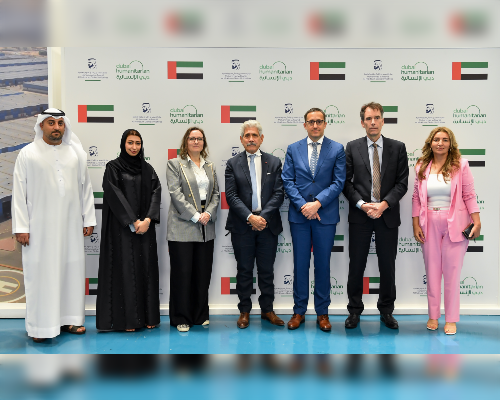
Dubai-UAE, 16 July 2024 — The European Union Ambassador to the UAE, H.E. Lucie Berger, along with a high-level delegation from the European Civil Protection and Humanitarian Aid Operations (ECHO), visited the Dubai Humanitarian facilities. The delegation included Tristan Simonart, Team Leader for Civil Protection, Jorg Roos, Team Leader for Cooperation with Gulf States, and Dragos Vacarescu, Liaison Officer for the EU Delegation to the UAE.
During the visit, the delegation met with Giuseppe Saba, CEO and Board Member of Dubai Humanitarian, who warmly welcomed them and emphasized the strong cooperation and relationship: “Dubai Humanitarian is a unique free zone authority. It is the expression of the profound commitment of the Government of Dubai to serve and support the international humanitarian community from Dubai to the world. Together with our partners and after 20 years of action, notably focused on relief operations, we are shaping the future of sustainable humanitarian action.”
“With humanitarian needs rising exponentially, delivering essential goods and services to save lives, alleviate suffering, and maintain human dignity is more important than ever. The EU, through ECHO, plays a pivotal role in this endeavour, ensuring that aid reaches those who need it most efficiently and effectively. Our visit to the Dubai Humanitarian facilities underscores our commitment to international cooperation and the vital work being done here to support vulnerable communities worldwide,” said H.E. Lucie Berger, EU Ambassador to the UAE.
The visit aimed to explore areas of exchange and experience sharing, recognizing ECHO as a significant humanitarian actor and donor for humanitarian logistics. Discussions underscored the importance of logistics as a key area for mutual learning and collaboration. The delegation highlighted the need for innovation and expressed a strong interest in working together not only within the UAE and the region but also with other donors, academia, and the private sector. The delegation also explored the Humanitarian Logistics Databank, examining ways to further this collaboration, to ensure that the humanitarian sector remains at the forefront of progress, effectively addressing emerging challenges.